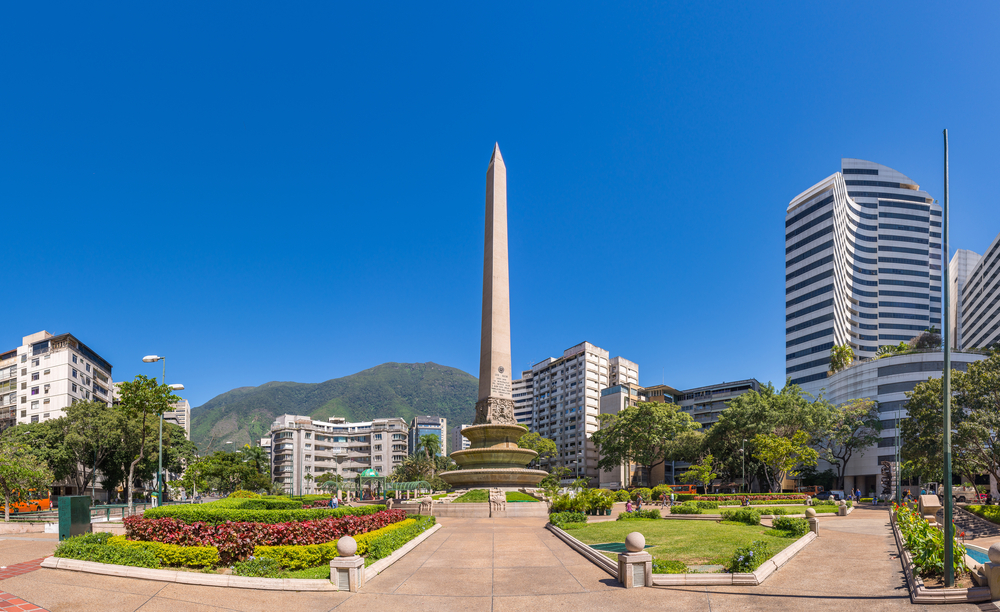Important geographic location
The Bolivarian Republic of Venezuela located in the northeast of South America, strategically limits to the north with the Caribbean Sea, to the east with the Atlantic Ocean and Guyana, to the south with Brazil and to the southwest and west with Colombia. Additionally, it has an advantageous connection to the east coast of the United States and Western Europe. Given its proximity to Ecuador, it has a climate with two well-marked rain and dry seasons, with temperatures ranging from 25°C to 78°F.
The country has a continental and insular area of 916,455 km² and owns a wide coastline that reaches 2,183 km. rich natural regions perfectly differentiated, which makes Venezuela one of the ten most diverse countries in the world.
Thanks to its geographical location, this country has an agricultural sector that can obtain high yields in crops such as coffee, cocoa, oil palm and fruit trees, or semi-permanent crops such as sugar cane, bananas, plantains and cassava. Additionally, given the abundance of radiant energy and the large pasture areas, the territory offers great potential for beef cattle and dual purpose (meat and milk). On the other hand, due to the extension of its coasts and its territorial sea, Venezuela also has a maritime fishing sector with a great projection.
World oil producer
Traditionally, Venezuela is recognized as one of the most important producers in the world, being the sixth world reserve of light oil and the largest of heavy oil. Its natural gas reserves are estimated at 147 million cubic feet. Profits from petroleum resources account for about 95% of export earnings and oil and gas account for 25% of the nation's GDP. This has earned it to be one of the vital sectors to sustain the economic growth of the country.
According to the Venezuelan government, crude oil production for this year will quadruple, which will attract significant foreign investment to the country and will once again position this founding nation of OPEC as one of the four largest producers in the world.
Skilled labor
Human talent in Venezuela has traditionally been recognized as one of the most qualified in the region, which is trained in the educational centers of the nation. Additionally, the Government has implemented a series of programs called “missions” which have reduced the illiterate population and expanded formal education coverage to historically poor social sectors, both at primary, secondary, technical and university levels of education.
Modern infrastructure
Because infrastructure is the fuel for the growth and socioeconomic development of any country, since it allows industrial production and this in turn generates greater productivity, a reduction in costs and the generation of decent living and working conditions for population.
Thus, in this nation, Venezuelan ports and airports are undergoing a privatization process, promoting the growth of important markets in these sectors. Venezuela is also one of the countries in Latin America with the largest number of paved highways. About 95,000 kilometers of roads, 60% are highways, which are located mainly in the north of the country, where the population density is higher.
Around 98% of the transport of goods moves with trucks through its highways. Additionally, Venezuela has 11 international airports and 36 domestic airports, the main one, located in Caracas, processes 90% of international flights, 84% of air cargo and 40% of domestic passengers.
This nation managed to establish a vast road network in a large percentage of the national territory, which was interconnected by its extensive bus line. Venezuela has 9 main highways such as:
- The Caracas-La Guaira highway that connects Caracas with the main air terminal and with the second largest seaport in the country.
- The Gran Mariscal de Ayacucho highway that connects the nation's capital with eastern Venezuela.
- The Regional Highway of the Center that connects the main highways of the country.
- The José Antonio Páez Highway that crosses the heart of Los Llanos from Barinas to Valencia.
- The Valencia Puerto Cabello highway that connects the industrial center with the most important seaport in the country.
- The Western Center Highway that connects the city of Barquisimeto with Puerto Cabello.
- The Barquisimeto Acarigua Highway that promotes transportation between the Central Western and Los Llanos regions.
Important natural resources
Venezuela has abundant natural resources and after oil, iron is the second most exploited mineral resource. It is estimated that this country has 15 billion metric tons of iron, of which 13% corresponds to high-grade iron ore, which is considered one of the highest quality in the world.
The country that is the 8th aluminum producer in the world due to its large bauxite reserves and its installed capacity of 8.7 million tons/year. Likewise, the country has enormous gold reserves, in fact, considered by some to be the largest in the world with some 162.2 MT in estimated reserves, located especially in the state of Bolívar and towns near the border with Brazil. Deposits have also been detected in the states of Yaracuy and Trujillo. Finally, the nation has more than 8 billion in coal reserves.
Free trade zone
According to SENIAT (National Integrated Customs and Tax Administration Service, attached to the Ministry of Finance), there are several types of free trade zones in your nation, such as two free ports, two Free Zones and finally two Free Zones.
While the Free Port of Santa Elena de Uairén , which is located near the Brazilian border, is an area that seeks to stimulate and favor the socioeconomic development of the region, the Free Port of Nueva Esparta State, which also has a preferential tax regime , allows the performance of all customs operations. For example, access is allowed to all merchandise and marketable goods, regardless of their origin, such as food and beverages, cosmetic products, medicines, products of the animal and plant kingdom, among others.
The Free Zone for the Promotion of Tourism Investment in the Paraguaná Peninsula was created by the Government to encourage the provision of services in tourism and commercial activity in this sector. Here you can enter all merchandise or marketable goods (personal or domestic use), which are required for hotel and lodging activities, event organizers, restaurants and transportation, among others.
The Cultural, Scientific and Technological Free Zone of the Mérida State (ZOLCCYT) manages a special preferential tax regime to stimulate the production, dissemination and distribution of cultural, artistic, scientific, humanistic and technological goods and activities in the region. To contribute to the control, promotion and registration, the Board of the Cultural, Scientific and Technological Free Zone of the Mérida State was created.
The Paraguaná Industrial, Commercial and Services Free Zone was established as a special territorial regime to promote national development through activities that promote foreign trade and contribute to technology transfer, job creation and regional development. This area is under the control of the Main Customs Office of "Las Piedras Paraguaná". It will be directed and managed by the Board of Directors of the company "Zona Franca Industrial de Paraguaná, CA (ZONFIPCA)
The ATUJA Industrial, Commercial and Services Free Zone (ZOFRAT) was created to promote national development through activities that mainly strengthen foreign trade and contribute to technology transfer, job creation and regional development.





